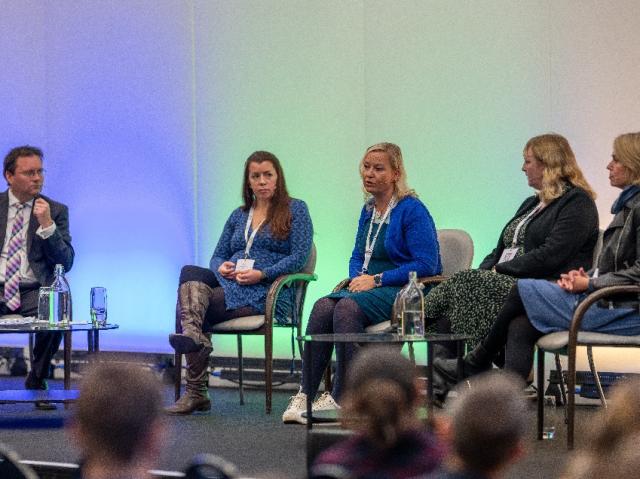
“The wellbeing of women is for the benefit of everyone”: insights into the importance of women’s health this World Menopause Day
18 October
World Menopause Day takes place every year and aims to raise awareness about the symptoms and support options available.
It is estimated that the one third of the UK female population is currently peri or menopausal and that it costs the UK economy 14 million working days every year, according to the Department for Work and Pensions.
It was one of the issues highlighted at this year’s Health and Care Research Wales Conference, where women’s health was a key focus.
During a women’s health panel, Dr Helen Munro, Clinical Lead, Women’s Health Strategic Clinical Network, NHS Executive, stated that more needed to be done to improve healthcare for menopause patients.
When asked by the panel’s chair, BBC Wales health correspondent, Owain Clarke, how to improve women’s health in general Dr Munro said: “I think we’re doing it here today,” adding that conversations were key in raising awareness and helping to tackle “unconscious bias”.
Rebecca Jones, Director of Research and Development Policy at the Association of the British Pharmaceutical Industry, provided insights into government policy's role in advancing clinical research and Professor Amy Brown from Swansea University shared her research on breastfeeding and infant care.
Dr Ceryl Davies, Social Care Economist at Bangor University, presented her findings on the impacts of gender-based violence and stated that changing the approach to women’s health requires an “inclusive” solution.
For Dr Davies, men must play a key role in the future of women’s healthcare. She suggested that in doing so that they would be helping to reduce overall costs and create a better all-around service and said: “The wellbeing of women is for the benefit of everyone.”
“We all have a role to play”
Women’s health is a high priority for the Welsh Government, and recent developments, such as the MESSAGE (Medical Science Sex and Gender Equity) project, were celebrated and discussed at the conference session called ‘Improving Women’s Health: advancing sex and gender equality in health and social care research’.
The inclusive study took a solution-based approach, bringing people of different background together into workshops to discuss how to better include sex and gender into the way research is practised.
It has already led to the finalisation of a policy framework and the MESSAGE team suggest that understanding sex and gender differences in UK research is crucial for scientific accuracy, patient safety, ethical responsibility, legal compliance, and minimising economic impacts related to health outcomes.
Dr Kate Womersley, Co-Principal Investigator of the MESSAGE project ended the session with a plea that everyone tries to ensure sex and gender will be included in research. The hope is that everyone, from researchers to the media, will ask themselves “who was included in this trial?”.
Dr Womersley added: “We all have a role to play.”
The MESSAGE team will also publish additional training materials and resources for researchers and funding organisations.
“It makes economic sense”
TED-style speakers provided further insights, with Dr Aimee Grant, Senior Lecturer in Public Health at Swansea University championing inclusivity in public involvement.
Rachel Joseph, a PhD student at Cardiff University, delved into issues surrounding endometriosis, a condition which affects one in ten women in Wales, according to the NHS.
Ms Joseph has previously collaborated with the charity Fair Treatment for the Women of Wales (FTWW) and both Cardiff and Bangor University to develop projects aimed at improving communication between patients and healthcare providers.
Now, she is a studying a PhD funded by Health and Care Research Wales titled ‘A Realist evaluation of the implementation of a women-centred NHS endometriosis website and tools to support more timely diagnosis and shared decision making with general practitioners’.
She said: “My determination to get the endometriosis patient voice heard has manifested into completing research and continuing to explore the worlds of advocacy and policy.”
Throughout the day, attendees had the opportunity to engage with experts, foster collaboration, and gain insights into the pressing issues surrounding women's health research.
With women accounting for 51% of the Welsh population, the conference served as a vital platform for advancing discussions on women's health, ensuring that diverse voices were heard and integrated into future research initiatives.
At the close of the women’s health panel, Rebecca Jones summed up why women’s health is important. She quoted a statistic from a 2024 World Economic Forum report, which stated that addressing the women’s health gap worldwide could add could potentially boost the global economy by at least $1 trillion annually by 2040, and said: “It’s personal and it makes economic sense.”
Help shape the future of women's health in Wales by sharing your experiences in our survey and contribute to research that will improve communication around healthcare for women and girls.